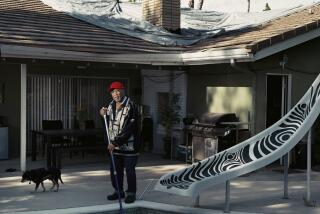Lost Dog Barks a Grim Tune
- Share via
In its bare-bones form, the story of Lost Dog has a nice, wholesome, Norman Rockwell-type ring to it:
Three neighborhood kids from Westminster, friends since grade school, grow up to form a rock band. They’re so close-knit that, to subsidize their struggling band, they take day jobs at the same civil engineering company in Irvine.
Some of the recollections passed along by band members Mike Pekovich, Scott Jessup and James Ross in a recent interview certainly fit that reassuring, slice-of-suburbia script: how Pekovich and Jessup have been best friends since they were 5 or 6 years old, how Jessup and Ross formed a bond as first-graders sharing a jumbo 64-pack of Crayolas, how they went through such rites of childhood as Little League and Indian Guides together.
But listen to the band’s debut album, and it doesn’t take long to figure out that Lost Dog’s musical vision is nothing that Rockwell would have wanted to paint.
With such unstintingly dark themes as war, crime, isolation, drug addiction, loneliness and emotional pain, “Lost Dog” is no cheerful stroll down Main Street in search of a strayed family pet. It’s a chilly look at a Desolation Row where it truly is a dog’s life.
Lost Dog sets its grim visions to a sound track in which dark, acoustic folk-rock merges with tough, driving, punk-influenced electric sound, a blend that sometimes recalls defunct, much-acclaimed Husker Du. The trio plays tonight at Bogart’s, opening for Firehose and Eugene Chadbourne.
Pekovich, who sings, plays guitar and writes most of the songs, said his dark themes may be a reaction against Rockwellian notions of what art should be.
“I had a long, structured art background where I was told art was supposed to support positive things and show beautiful things and happiness,” said the 26-year-old, who holds a bachelor of fine arts degree from Cal State Long Beach. “I felt there was much more that needed to be expressed.
“We’re not purposefully dark. I guess if (something) wasn’t a problem, or if it wasn’t bothering me, I wouldn’t write a song about it. My goal is not to be depressing, but to examine myself. Maybe (listeners) will examine themselves and get some kind of support and reinforcement and see that they’re not alone, maybe they’re not the only ones with this problem.”
Lost Dog’s name is intended to reflect “the idea that there aren’t a lot of causes to fight for or rebel against,” Pekovich said. “A lot of my friends see their world view as just a big jumble. They’re not sure where they fit in, and what they’re supposed to get out of (life).”
The band’s reaction to these existential doubts is summed up in Pekovich’s spoken introduction to the album, with its tongue-in-cheek-affirmation: “I bark, therefore I am.”
Lost Dog does lighten the album’s heavy thematic load with some good melodic hooks and interesting guitar textures, and the band shows a sense of humor (albeit black humor) by ending the LP with a thrashing punk tall tale about a sociopath so tough that the electric chair can’t kill him.
The members of Lost Dog didn’t begin to play music until 3 years ago, when Pekovich and Jessup started their first band. At that point, they had been out of touch with their old friend Ross for a few years. But when Jessup, who plays bass, ran into Ross between classes at Orange Coast College and found that Ross recently had begun to play the drums, the three were reunited.
Each was in his early 20s, making them relatively aged rock novices. “It’s our biggest asset that we all started together--and our biggest problem,” Ross said. The problem, the band members agree, is that they have had to learn musical skills from scratch. The advantage is that, rather than chaining themselves to one way of doing things, they have been able to evolve freely.
The changing music has been reflected in a shifting band name. At first they called themselves Moral Kiosk, after a song by R.E.M., a band that heavily influenced them at the start. Then, looking for a lighter name and a heavier, less self-consciously artsy sound, they dubbed themselves the Bash Hounds. That turned into Lost Dog about a year ago, when the group started working on its first record. The album came out last fall on Out There Records, a custom label owned by local rock promoter Jim Palmer.
So far, Lost Dog’s members say, they have not found a substantial local audience. The band has played only once or twice a month on the average, in Orange County or Los Angeles clubs. Tonight’s show will end a performing drought of more than 2 months.
But “Lost Dog” has been getting scattered air play on college radio stations around the country, and the band will go off next week on its first tour, a 2-week excursion up the West Coast to Seattle, sharing some of the dates with another Orange County band, Mind Over 4.
After that, Lost Dog will work on building its local following and on stirring up record company interest in its next batch of songs.
“We hope,” Jessup said, “that somebody will throw a dog a bone.”
Lost Dog plays tonight at 9, opening for Firehose and Eugene Chadbourne at Bogart’s, in the Marina Pacifica Mall, 6288 E. Pacific Coast Highway, Long Beach. Information: (213) 594-8975.
More to Read
The biggest entertainment stories
Get our big stories about Hollywood, film, television, music, arts, culture and more right in your inbox as soon as they publish.
You may occasionally receive promotional content from the Los Angeles Times.











